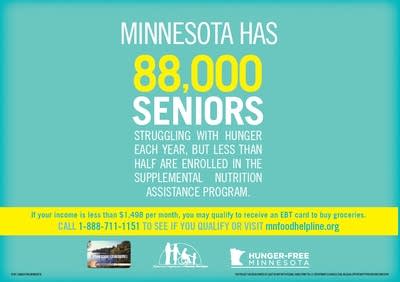Minnesota campaign aims to expand food stamp rolls
[image]
Beginning this week, you may see advertisements in your community encouraging people to sign up for food stamps.
Part of a new statewide outreach campaign to enroll more Minnesotans in the federal Supplemental Nutrition Assistance Program, the ads encourage senior citizens and the newly unemployed to seek government help.
About 65 percent of Minnesotans who qualify for food stamps receive them. The new campaign aims to convince more people to sign up using ads all over the state — on buses, in clinics, in food shelves and on the radio.
Create a More Connected Minnesota
MPR News is your trusted resource for the news you need. With your support, MPR News brings accessible, courageous journalism and authentic conversation to everyone - free of paywalls and barriers. Your gift makes a difference.
State officials and anti-hunger groups launched the campaign on Wednesday.
Lt. Gov. Yvonne Prettner Solon said the governor's office wants all who are eligible to enroll in the program, which not only ensures Minnesotans have enough to eat and be healthy, but also helps the state's economy.
"Every dollar of use of the SNAP program, there's $1.73 that's generated for our economy, which helps our grocery stores," Prettner Solon said. "It helps our farmers. It helps everybody along the food supply chain."
Only 41 percent of eligible seniors in Minnesota are enrolled. Marlys Toogood, a 78-year-old who delivers free meals to seniors in Roseville, attended Wednesday's unveiling of the ad campaign. She said it's clear why seniors aren't signing up.

"I think they're proud," Toogood said. "They came through the Depression. They knew hard times, and they think they can make it. They don't want to admit to having to depend on somebody else."
The ads seek to address that stigma — and get the word out to people who don't know they're eligible. Designed by a marketing team at General Mills, the ads tell people exactly what it takes to qualify, said Collen Moriarty, executive director of Hunger Solutions Minnesota, which is running the outreach campaign.
"Calling out exactly how much income you have to have to participate in the program is illuminating to people," she said. "A senior can think, 'Oh, I make less than $14,000 a year on my fixed income. I might be able to get help.'"
State Rep. Steve Gottwalt, chairman of the House Health and Human Services Reform Committee, supports the effort.
"I think obviously we create these programs to help people in need," Gottwalt said. "So if there are people in need eligible for these programs, I think it's perfectly appropriate to reach out to them."
However, Gottwalt said he wants to make sure policies are helping people get back on their feet.
"Our goal is not to create greater dependency and put more and more people on government programs, but to try to help them so they can be more self-sufficient and eventually not need government programs," he said.
[image]
Mitch Pearlstein, president of Center of the American Experiment, has some hesitation about the new campaign.
"It invites people to be dependent when they don't necessarily have to be," he said.
Pearlstein said he supports enrolling in food stamps if a person can't feed themselves or their family. But he said just because people are eligible, doesn't mean they should sign up.
"If someone is eligible, but doesn't think they need the governmental service, but are persuaded to use that governmental service, that's not a great idea," he said.
The outreach is part of an effort by Hunger-Free Minnesota to make sure all Minnesotans have consistent access to enough healthy food. It's funded through a $200,000 grant from the General Mills Foundation and a matching grant from the United States Department of Agriculture.
Editor's note: Minnesota Public Radio is a partner in the Hunger-Free Minnesota project. The partnership includes funding for MPR News to report on hunger and related issues.
